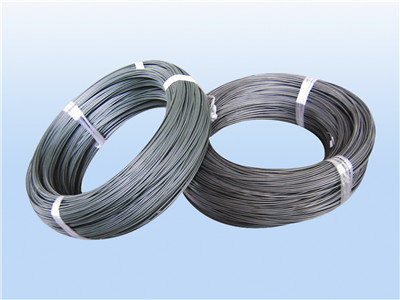Alumel - 2.4122 - Nisil® wire

International Equivalent
| Mark | Analogue | W. Nr. | Aisi Uns | En | Order |
|---|---|---|---|---|---|
| NMtsAK2-2-1 | 2.4122 | NiMn3Al | Delivery from the stock, in stock |
I have unassuming taste, as Oscar Wilde once complained, the best is good enough for me.
Composition of Alumel.
This is a thermocouple alloy, most of which is up to 96% nickel. The alloy also contains 1% Co - to maintain the necessary thermal EMF. Aluminum in the alloy is no more than 2.5%, and there is also manganese (Mn) - up to 2.2% and silicon (Si) - up to 1.2%. Alloying with zirconium (0.06% Zr), and boron (0.03% B) is one of the new alloys possible.
Advantages of
The alloy's density is 8.48 g/cm³, melting point 1440°C, specific electrical resistance - 0,32 Ohm-mm2/m, coefficient of linear thermal expansion - 13,7-10-6/°C, annealing point = 900-950°C. The physical properties of alumel are determined by nickel, which forms the base of the alloy. Among the main advantages are heat resistance and resistance to aggressive environments. These qualities are strengthened by alloying elements. Alloying increases ductility at t° 600 ° C - 1100 ° C, provides long-term strength from 700 ° C to 900 ° C, allows to use alumel (with a stable thermo-EMF) to 1300 ° C.
Disadvantages
Nickel-based alumel wire is quite expensive, since nickel is not a cheap metal. Its main disadvantage is its susceptibility to the damaging effects of sulfur when the temperature rises, which leads to corrosion and embrittlement. This can be corrected by increasing the percentage of silicon in the composition and reducing the percentage of aluminum. Such a change increases the service life of the thermocouple at temperatures above 1000°C.
Applications
Alumel is widely used in pyrometry in the form of tape or wire Ø 0.2 - 3.2 mm for production of thermoregulators, thermocouples, compensation wires. Thermocouple is formed by 2 heterogeneous conductors soldered at their ends and capable of generating thermal EMF when the temperature rises. One of the electrodes is positive and the other is negative. Alumel is used in a chromel-alumel thermocouple as the negative electrode to measure t° up to 1000 °C. Thanks to alloying, this thermocouple can withstand short-term exposure and higher temperatures up to 1300 °C, even when operated in a corrosive environment. Alumel compensating wires are used to connect the thermocouples to the transducers and directly to the measuring instruments themselves to reduce the error of the readings. Because of their diminutive size and high accuracy, chromel-aluminum sensors are widely used in aerospace, automotive, and other modern industries.
Supplies
Alumel NMCAk 2-2-1 is available in the following forms:
- Wire (Ø 0.10 - 12.00 mm);
- Round (Ø 12.0 mm - 100.0 mm);
- Band (thickness 0.1-5.0 mm, width 3-600 mm).
| Ni+Co | Fe | C | Si | Mn | Co | Al | Impurities |
|---|---|---|---|---|---|---|---|
| 91.5 - 95.15 | ≤ 0.3 | ≤ 0.1 | 0.85 - 1.5 | 1.8 - 2.7 | 0.6 - 1.2 | 1.6 - 2.4 | total 0.7 |
Physical properties of the alloy alumel NMzAK2-2-1 at 20 °C
| Hardness, alloy soft | Hardness, alloy hard | Melting temperature, °C: | Hot work temperature, °C: | Annealing temperature, °C: |
|---|---|---|---|---|
| HB 10 -1 = 130 MPa | HB 10 -1 = 250 - 300 MPa | 1440 | 1250 - 1000 | 900 - 950 |
Buy at the best price
Evek GmbH stocks a wide range of thermocouples. Our representative offices are located. You can make a purchase without leaving the office, through the Company's website. To purchase you only need to place your order and click on the "buy" button. If necessary our managers can consult you on any current questions. They will give all necessary information concerning products, price range, and terms of realization. Lead time is minimal. In case of bulk purchases discounts are available.

